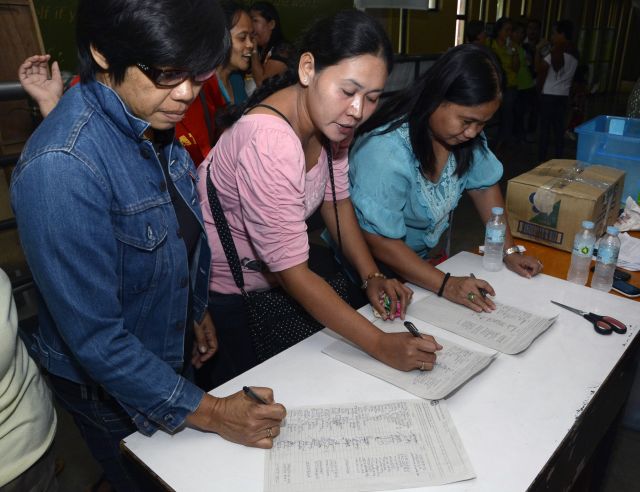Barangays act on Pope’s call to combat climate change

Global Catholic Climate Movement launched the 1million Signature campaign. (CDN PHOTO/CHRISTIAN MANINGO)
Some barangays in Cebu City are crafting work plans to combat the effects of climate change and improve resilience in response to Pope Francis’s appeal.
In his second encyclical, Laudato Si: On Care for Our Common Home, the Pope appealed to “every person living on this planet” to acknowledge the urgency of the environmental challenges and help shape the future of this planet.
Melvin Purzuelo, Aksyon Klima Pilipinas convenor, said the work plans are based on the 7 main points of the Pope’s encyclical.
The plans will be attached to a manifesto by the Pagtambayayong Foundation, Inc. that will urge world leaders to adopt a legally binding and universal argument to cut carbon emissions.
Pagtambayayong targets to gather over 1 million signatures for the manifesto.
“This signature campaign is part of an international call to over 193 member states of the United Nations to do something concrete about climate change,” said Paula Fernandez, executive director of Pagtambayayong Foundation Inc.
During a forum on the Pope’s encyclical last Wednesday, over 30 barangay representatives from Cebu City agreed to draw up the work plans which they will also implement in their barangays.
Purzuelo said that involving the grassroots level of governance is the key to creating inclusive and effective solutions to climate change, especially in the local setting.
“People think our past administrations have done nothing to address climate change. But I truly believe that the national laws are in place. All we need is strict implementation,” he said.
He cited the existence of the Ecological Solid Waste Management Act of 2000, the Philippine Clean Air Act of 1999, and the Clean Water Act of 2004. These laws are supposed to be implemented by the local government units.
The Solid Waste Management Act metes fines as high as P500,000 and imprisonment to violators who do not segregate nor throw their trash properly. The Clean Air Act and the Clean Water Act impose fines as high as P100,000 every time the air or water is contaminated with copious amounts of chemicals and pollutants.
Because most local officials are not aware of these, Purzuelo said violations are being committed right under their noses.
“The prominence of coal-fired power plants in the city and all over the country is enough reason for me to believe that we still lack education and awareness on the importance of these environmental protection laws,” said Purzuelo.
Teddy Navea, Central Visayas secretary general of the Sanlakas Partylist, denounced the rise of coal power plants in the country.
As of 2015, Navea said there are over 59 coal plants in the Philippines, 15 of which are in the Visayas region.
“They are also planning to build a 300-megawatt coal plant in Naga City by 2019, and that will only add to the carbon emissions of the country and will contribute to worldwide pollution,” Navea said.
He called on the barangay representatives present to ensure that upon creating their work plans, they will be able to prevent the rise of “environmentally damaging projects” like the coal power plant.
“Our country needs to be protected. We should all join the crusade, and join the campaign that urge global leaders to make real action against carbon emissions, and placing profit over the welfare of the people,” Navea said.
UN member states will meet on November 30 to December 11, 2015 in the Conference of Parties (COP) 21 of the United Nations Framework on Climate Change committee.
Disclaimer: The comments uploaded on this site do not necessarily represent or reflect the views of management and owner of Cebudailynews. We reserve the right to exclude comments that we deem to be inconsistent with our editorial standards.
